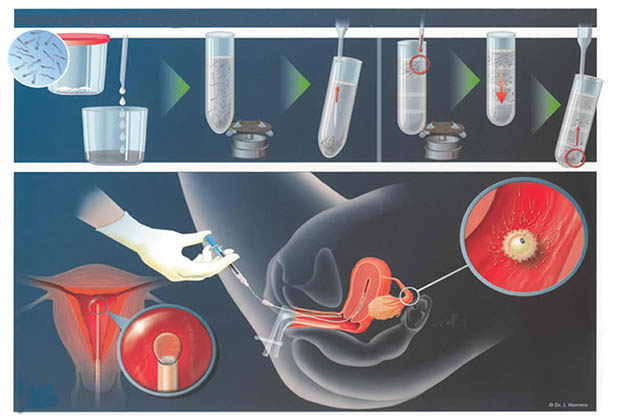INTRAUTERINE INSEMINATION
What is Insemination?
Insemination is a treatment applied in cases of male infertility with mild sperm parameter abnormalities, unexplained infertility, and stage 1-2 endometriosis. In this procedure, the sperm is washed, and the motile sperm are concentrated. On the day of ovulation, the sperm is inserted into the uterus. The aim is to develop one or preferably 2-3 eggs and, after an ovulation trigger shot, ensure that these eggs encounter as many sperm as possible in the fallopian tubes. This increases the chances of pregnancy.
Is Insemination Possible for Older Women?
In older women (over 38), with long infertility duration (7-8 years or more), and low ovarian reserve, the success rate of pregnancy is very low. In such cases, insemination is not recommended as it would result in wasted time. Instead, IVF should be applied. Since fertilization occurs in the fallopian tubes, it is necessary to confirm that at least one tube is open with an HSG (hysterosalpingography) or laparoscopy before insemination.
How is Insemination Done?
In women undergoing insemination, the ovaries are first stimulated using pills (Clomid, Serofen) or injections (Gonal-F, Puregon, Menogon, Merional). The goal is to retrieve multiple eggs. However, if more than four follicles (fluid-filled sacs containing eggs) form, the couple should be informed about the risk of multiple pregnancies, and the treatment should either be canceled for that month or switched to IVF. After the eggs reach a mature size, an ovulation trigger shot (Pregnyl, Ovitrelle) is administered. About 36 hours after the injection, the washed, concentrated sperm is injected into the uterus using a soft catheter. The procedure is simple and painless.
What is the Pregnancy Rate for Women Undergoing Insemination?
Couples should be informed that, even under the most optimal conditions, the chance of pregnancy is approximately 15%. This rate depends on factors such as the woman’s age, infertility duration, the presence and severity of male sperm problems, and the normal function and patency of the fallopian tubes. Insemination should be done no more than 3-4 times, and if pregnancy does not occur, IVF should be considered. IVF is particularly recommended for women over 38, with low ovarian reserve, or when the motile sperm count is below 5 million/ml.


